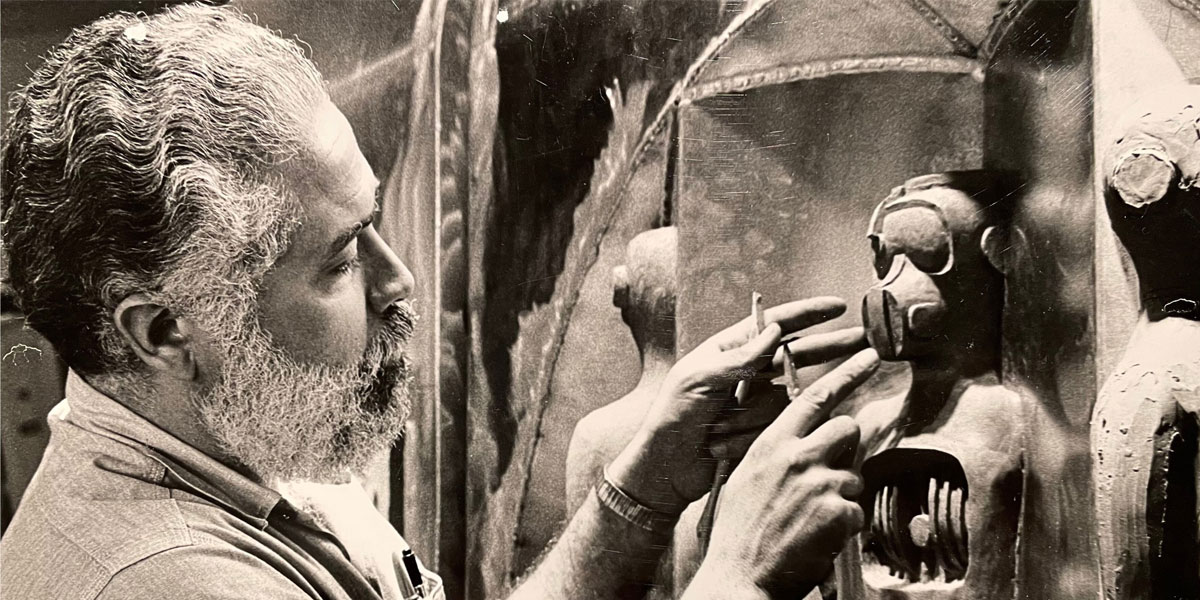Art Museum exhibition features retrospective of pioneering faculty member
The Binghamton University Art Museum opens for fall 2023 with a retrospective of sculptor Ed Wilson, a long-serving faculty member and the first Black full professor in the University’s history, and complementary exhibitions featuring artists of color.

Ed Wilson may not be a household name, but the new exhibition at the Binghamton University Art Museum hopes to change that. Wilson, who died in 1996, was an innovative sculptor and civil rights advocate. When he was named chairperson of the Department of Art and Art History in 1968, he was the first Black person to serve in that capacity in the University’s history.
A legacy revisited
Throughout his career, Wilson produced dozens of sculptures using bronze, aluminum, wood and other media, and his work was shown in exhibitions at museums and galleries around the country. Wilson also completed many civic commissions, creating art in public environments, including parks, downtowns and educational institutions. The Binghamton University campus is home to Wilson’s Falling Man sculpture, located near the Fine Arts Building.
Thanks to a generous grant from the Terra Foundation for American Art, the Museum will host the first major exhibition of Wilson’s art in over 50 years. Ed Wilson: The Sculptor as Afro-Humanist will open Sept. 7 and feature a comprehensive retrospective of Wilson’s 45-year career.
The exhibition, organized by Tom McDonough, adjunct curator and professor of art history, with assistance by Claire L. Kovacs, curator of collections and exhibitions, will highlight Wilson’s surviving sculptural works and drawings, assembled from Museum holdings and loans from private and public collections nationwide, along with the artist’s personal archives held by his family.
“Ed Wilson was a member of a pioneering generation of Black artists who struggled against discrimination and indifference to build distinguished careers,” McDonough said. “He was also an indefatigable advocate for the humanity of African Americans at a time when legalized segregation still defined American public life. This exhibition hopes to honor both aspects of Wilson’s achievement, which he believed were inseparable.”
Additionally, the exhibition will include highlights of oral histories from Wilson’s colleagues, students, family and the broader community. These oral histories represent Wilson’s impact across various communities and will be integrated into the exhibition allowing visitors to read excerpts as they view the collection. The oral history project will eventually become part of the University Archives.
Black art exhibition complements Wilson retrospective
Along with the Wilson retrospective, the Museum will feature Memory & Soul: Black Art from the Permanent Collection, including works from the 1960s and 70s that represent pieces from the Museum’s earliest efforts to build its permanent collection. Kovacs, who organized the exhibition, has noted new ongoing efforts to increase the representation of Black artists and artists from underrepresented communities in the permanent collection.
“Like many museums across the United States, the Binghamton University Art Museum has begun the work of looking at representation and inclusion in its collections,” Kovacs said. “This exhibition’s title is inspired by Ed Wilson’s own writing, and it is our hope that these works, some of which were brought into the collection while Wilson taught at Binghamton and others that were added after his retirement, provide a means by which our visitors can reflect on the role of Black art, providing a lens through which to interrogate the “memory” of the histories of anti-Black violence on which this country is built and to counteract it with a bit of hope, joy and “soul.”
Three additional student-curated exhibitions will also open Sept. 7: Culture and Commodity: Inquiries into the African Art Collection, Judging a Book by Its Cover, and What is a Magic Realist? All exhibitions will run through the fall 2023 semester.
The Binghamton University Art Museum is located in the Fine Arts Building and includes over 4,500 objects —from antiquity to present day—representing 50 years of collecting. Admission to the Museum is free and open to the public. Find more information, including hours of operation here >
